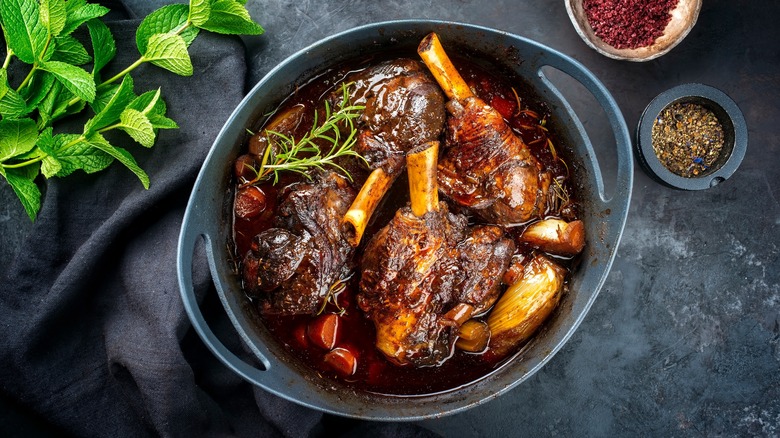This Is How An Executive Chef Slow Cooks Lamb For Perfectly Flavorful Results Every Time
Lamb is an underutilized meat in America, but that doesn't mean you need to learn anything too complicated to cook it at home. While the USDA says that the average person in the United States eats over 90 pounds of chicken per year, they will eat only a pound of lamb or mutton. Part of this is cultural, we're all about beef and poultry, but it's also price, as lamb racks and rib chops go for a pretty penny at the supermarkets that do bother to carry them. But there are some cheaper options, like lamb shoulder or lamb shanks, that have that flavorful, grassy taste you want if you just know how to cook them right. Those cuts that are tough, with lots of connective tissue, and meat like that usually calls for slow cooking to get the best result. So Tasting Table reached out to an expert, Wissam Baki, the executive chef of AMAL in Miami, to get his advice for perfectly slow-cooked lamb.
Baki says, "The best way [to] slow-cook lamb is to marinate the cuts," which can be done for as little as four hours for small cuts, and up to 24 hours for larger ones. Baki told us that for a good lamb marinade, he uses "a mix of onion, celery, cinnamon sticks, carrots, leeks, cloves, thyme, rosemary, and red wine to impart extra flavor."
Braise your lamb in a complex marinade for a juicy, flavorful dinner
Once you are ready to cook your lamb, Baki explains that "braising is best for a combination of roasting and boiling to tenderize your lamb." He starts off by getting some color on the lamb, so pat it dry and then sear your cut, with Baki recommending butter or vegetable oil. He says that the braise can even be completed in the oven and his guidance is that we should be "covering the lamb with aluminum foil at 350 degrees Fahrenheit for 2.5 to 3 hours, depending on the size of your cuts." Once the lamb is tender and done cooking, Baki makes use of the whole pot, saying, "I really enjoy making lamb gravy from all of the juice within the braising liquid." You can do this by cooking down the liquid in an open pot, or by using thickening agents like cornstarch or a roux to get the job done quicker.
As for flavor, Baki goes with a mix of tangy Mediterranean ingredients, explaining, "I typically use red wine for acidity, a little pomegranate molasses, and cider vinegar for the perfect flavor combination." Lamb's strong, gamey flavor can stand up to pungent sauces like this, and Baki's recipe can be accented with other ingredients like balsamic vinegar, brown sugar, or butter, depending on your preferences. With such a simple recipe as your guide, you can easily make lamb a regular part of your dinner rotation.

